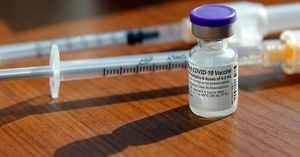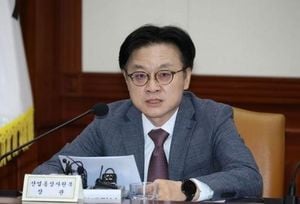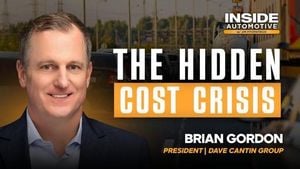Renowned violinist Nigel Kennedy, noted for breaking records with his renditions of classical works, particularly Vivaldi's Four Seasons, has opened up about his battle with partial deafness following his third Covid vaccine. Speaking candidly, Kennedy disclosed how this experience significantly impacted his career and daily life.
During an interview with The Observer, he shared the unsettling reality of losing his hearing for about three months. "I wasn’t in a fit state to play concerts," he admitted, highlighting the dual challenge he faced after the vaccine. Compounding his hearing issues was the trauma of breaking the little finger on his left hand, adding physical pain to the distress of not being able to perform.
"I turned it all over and said, 'This isn’t gonna work, I’m going to have to teach myself to hear again.'" Kennedy explained how he had to train himself to listen again — focusing not just on notes but also on their subtler elements, such as overtones and undertones. This retraining was no small feat, especially for someone whose life revolves around music.
Reflecting on his situation, Kennedy noted, "I built it from the ground upwards again, but I think now I’ve got a much greater sense of intonation than I had before." His return to music was filled with trepidation; the very thought of playing with colleagues under such conditions worried him. "I didn’t want to play with colleagues if I was out of tune," he said.
The musician's fatigue was another major issue he faced during this period. He described his fatigue as feeling like he had transformed entirely: "I turned to feel like I was...catatonic at four o’clock every day. I’d be nodding off, whatever I was doing. I’d wake up and think: ‘thank God I haven’t dropped the violin.’" A sentiment many may resonate with, reflecting the broader impact the vaccine had on his health.
What’s particularly interesting about Kennedy’s case is the uncertainty surrounding the exact cause of his hearing loss. Although he recognizes the potential link to the vaccine, he also mentioned knowing of another musician who experienced similar auditory challenges after receiving the jab. "I cannot be sure it was the vaccine, but I can say it happened close to my vaccination," he reflected, emphasizing the need for awareness without jumping to definitive conclusions.
While adjusting to life after his hearing loss, Kennedy demonstrated remarkable resilience — pushing through adversity to reclaim his musical abilities. His commitment to listening and practicing led him to rediscover his musical capabilities, deepening his appreciation for the art form. Ballads, jazz, rock: whatever the medium, he persists, illustrating the power of music to heal and connect.
Now feeling more than capable of taking the stage again, Kennedy recently revealed his eagerness to perform. He is preparing for the "Concert for Peace, Acceptance and Forgiveness," set for January 29, 2025, at the Barbican, featuring collaborations with other artists, including Cleveland Watkiss.
Speaking about the concert’s theme, Kennedy expressed hope to address the negativity rampant in today’s society. "If there’s a problem, we need to solve it as human beings together, not as just one isolated definition of what our species is. We’re all the same people," he implored, underlining the universal nature of music as a remedy for division.
While his road to recovery wasn't easy, Kennedy's story resonates deeply amid the broader discussions surrounding vaccine side effects. His ability to rise back from temporary deafness marks not only his personal triumph but also affords insight to others, both artists and laypeople, who may be grappling with similar experiences.
Overall, Kennedy's candidness serves as both inspiration and cautionary tale, urging awareness and compassion as society navigates through complexity. His path may have been littered with challenges, yet his unwavering love for music proves its ability to transcend struggles, shining light where dark moments almost dimmed the sound.



